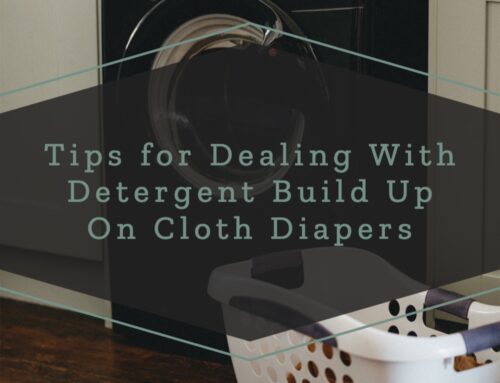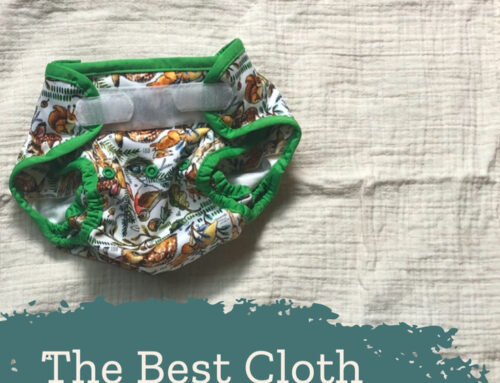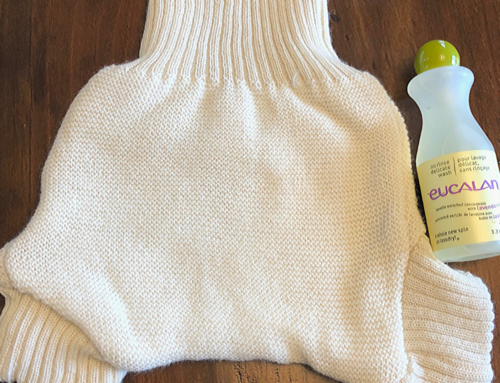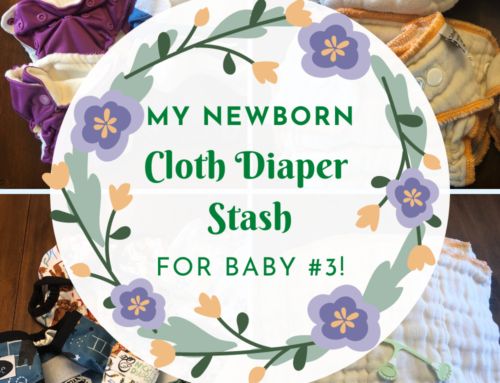Laundry detergent is a big deal in the cloth diapering world. It seems everywhere you look, you get conflicting advice about what kind of detergent you need and how much you need. Do you really need a special cloth diaper laundry detergent?
Some brands of diapers will push for you to buy their own line of detergent by saying it’s the only one that’s safe to use on their diapers (not true!). Other people will want to buy the most natural detergent possible (though there are some acceptable eco-friendly detergents you can use), but the majority of what is marketed as “green” is not strong enough to clean human waste.
Another common issue is that we LOVE our wonderfully scented and soft clothes. Some laundry detergent has added fabric softeners nowadays, and while that may be a perk for general laundry, fabric softeners can negatively impact the absorbency of our diapers.
So with all of these potential issues surrounding laundry detergent, should we buy a special kind?
No! You do not need a special kind at all. There are just a few things you need to consider with your water, and a few things to make sure check out with your current detergent.
Water: Hard, Soft, Normal?

“Average” water is the most low maintenance for cloth diapering. Not too hard, not too soft. It’s not that you can’t cloth diaper with super hard or super soft water, but you might need to make a tweak to your wash routine & detergent amount. Currently, my water is super soft– 0 ppm. I have no issues with this, but I know some other people do.
Note: As we talk about developing your routine around the type of water you have, my biggest advice is this– don’t overthink it, and don’t stand there watching your washer and over-analyze what it’s doing. I say this because I think some people create an issue based on seeing a bit of suds here or there, or whatever else they observe, and they set out to try to fix something that isn’t broken.
If your water is very soft, it is probably fine for washing diapers. The best thing to do is just to try to see. You can test your water to see just how soft it is if you feel that you really need to know, but honestly you will know if your wash routine is working or if it isn’t–your diapers will get clean, or they won’t! You can tweak from there. Usually, people with super soft water need to use less detergent.
Now for hard water: If your water is very hard, you might add a little Borax or Calgon to your washing machine when you wash your diapers. However, if it is just moderately, that probably isn’t necessary with a good powder detergent. Some detergents (like plant-based eco-friendly detergents) don’t perform as optimally if the water is even slightly hard, so adding a softener may be necessary.
Do not start adding water softeners to your diaper laundry until you have tested your water, know what level of water hardness your detergent covers, and have truly determined that you need to.
No Fabric Softeners

Did you know you’re not supposed to use detergents with fabric softeners on towels for the same reason? I had never thought about that before and I’m sure I’ve made my towels less absorbent in the past by doing that. Thing is we probably just don’t notice it as much with towels…we will definitely notice it with diaper leaks!
If the detergent you are using has fabric softener in it, consider switching detergents, or just get a second bottle/box of the kind you like in its “original” form to use specifically for your diaper loads.
Be Wary of Natural Detergents

There are some plant-based detergents that rate highly for cloth diapers. If an eco-friendly detergent is important to you, go for a tried and true option. If you are partial to a certain detergent but are worried it’s not powerful enough for waste, you can continue to use it on your regular clothes and get a separate one for diaper loads.
If you are worried about your detergent from more of a skin-sensitivity standpoint rather than an environmental standpoint, you can consider using a free and clear version of a mainstream detergent. Some good choices are Tide Free & Gentle and All Free & Clear. Not all free & clears will work, though.
Don’t Make Your Own Detergents
Another group of people that cloth diapers appeal to is the frugal people out there–I’m also part of this group! You make your own laundry detergent all you want for regular laundry that isn’t heavily soiled or highly dependent on absorbency function, however do so with caution because modern washing machines aren’t meant to be used with homemade “detergent” either. Diapers are slightly more complicated than washing a few shirts because of the soil level.
Most homemade laundry detergents aren’t actually detergents–they’re soaps. The difference between detergents and soaps are in the ingredients. Soaps aren’t ideal for washing diapers because they can leave a residue that repels moisture. They also lack the power necessary to truly get the diapers clean. They can coat your machine and cause build-up, impacting its efficacy.
All that said, there are cloth diapering families out there that make their own “detergents” and cloth diaper. I can’t imagine their results are as good as those who use a mainstream detergent, but it is worth it to them. Their laundry routine is likely a lot longer and more involved, most likely stripping their diapers often. For the most optimal cloth diapering experience possible, I recommend the following detergents.
Recommended Cloth Diaper Detergents
**For all detergents listed here, follow what is recommended on the package for the amount needed for soiled laundry.
**Also note–follow the principles above when selecting these detergents. Certain brands listed below may have a variety of detergent on the shelf that doesn’t meet the above requirements. If there is a specific kind within that brand that is better than others, I try to specify, but some may be missed. (For example–you can get #2 below in a “with Downy” version–that is not what you want. You want regular).
1. Tide Original Powder–this detergent is probably the most highly and frequently recommended detergent in the cloth diapering community. It has some water softeners build into the detergent, which makes it the perfect choice for those worried about their water hardness.
2. Tide Liquid Detergent and/or Pods–note: these do not have the added softeners like the powder does (those are usually only found in powder detergents).
3. Gain
4. Seventh Generation Ultra Power Plus
5. Purex
6. Wisk
7. Method
8. Arm & Hammer
9. All Powder
10. All Powder Free & Clear
11. Planet Ultra 2x Concentrated
12. Biokleen Premium Plus Powder
13. Biokleen Laundry Liquid (I was able to use this successfully in my regular washer with an agitator, not in my HE washer)
14. Ology
15. Country Save
16. Attitude
17. Cheer
18. Foca
19. Kirkland Environmentally Responsible
20. Persil
Time to Get Washing!

- You do not need a special detergent (you likely recognize most or all of the brands listed above!)
- Don’t buy detergent with added fabric softener
- Be wary of plant-based detergents and pick a tried and true one if you want to go that route
- Consider how hard or soft your water is when choosing a detergent
If you cloth diaper already, which detergent do you use? If not, does yours match the requirements here? Let me know in the comments!





This is such a helpful article! I never thought about taking into consideration the harshness of the water. I definitely need to check which water our washer uses. I also really love the list of the detergents, that will be very helpful when we go replace our detergent. Right now we’re using the honest company baby detergent, but I’d like to try a different one too.
Hi Sydney! Honest Co. is a great detergent for regular laundry, but it’s considered too weak for diaper laundry (if you are doing that). If you prefer green detergents, here are some that work well for diapers: Environmentally Friendly Laundry Detergent – 4 Green Choices for Your Home
I think my biggest concern with cloth diapers is that the waste actually gets taken care of. I know the concern should be how it feels on baby, but I get a little grossed out at the idea of any of that diaper mess being left in the washer when I put the next load in. I did have the thought that a natural cleaner would not fully be able to deal with it, but I’ve also had recommendations of adding white vinegar. Have you ever heard of that?
Hi Jaime! Here is an article that might help clear up the waste issue for you: Cleaning Cloth Diapers at Home – What Do I Do with the Poop?
Other than newborns on a liquid diet, you should flush the waste down the toilet before sending your diapers to be washed, so the waste does not actually go in your washer.
Vinegar is okay once in awhile, but if added to every load, it can actually wear out your diapers and prevent your detergent from working as well. I’ve personally never used it on my diapers, but I’m not too worried about things being soft. I don’t use softener for any of my laundry. I’m kind of sensitive to scents being too strong, so I just don’t prefer them.
It’s great you lid some light on how cloth diapers should be washed. Too many people like to over complicate everything. Separate detergents for everything – baby clothes, sport clothes, towels, dark clothes. Any idea that can get more of your money. I’m so happy you said the truth – regular detergents are fine, even for cloth diapers.
When I lived in Israel, the water was very hard. I had to add Calgon to every load. Here (in NJ area) it’s not an issue at all. So it can be skipped. Instead of a softener, vinegar is recommended for towels. Do you think it’ll work for diapers as well?
Hi Mary! Vinegar is generally not recommended on diapers because they can wear them out faster–it’s just kind of hard on them. That said, if you use it once in awhile that’s okay, but just not each time you wash.
Hello there. So we don’t need a special kind of diaper laundry detergent? So, I am learning so much from this post right now. I never knew that fabric softeners are not advisable to be used for our clothes laundry. This post is quite educative as it talks about types of water and how to make them suitable for laundry use. The you for the recommendation and tips.
No problem! Nope, no special/specific detergent. 🙂 There are some “cloth diaper specific” detergents out there, but they are kind of a hoax and many of them don’t work well anyway due to trying to make them as natural as possible. For best results, you’re better off choosing a regular detergent of your preference and just making sure that it doesn’t have added fabric softener. As far as added brighteners, fragrances, etc…that’s up to you. Some people avoid them but they aren’t going to hurt your diapers, they just may affect sensitivities.
Also, I’ll just clarify quick that there is nothing wrong with using fabric softener on your regular clothes if you want. You just want to avoid using it on laundry that is meant to be absorbent, like towels and diapers. It can leave a coating that repels water instead of absorbing it.
Hi Holly,
I haven’t had to wash diapers for a few years now, but I remember how concerned I was each time I did a load. I was always worried about getting them clean without having perfumes added. I had a baby with very sensitive skin and the fragrance was something we just didn’t need. I wish your article had been available then. I didn’t understand how water hardness effected the cleaning ability of the detergent. I’m sure that would have made a big difference. I’ve also been interested in exploring eco-friendly detergents, and your chart was very helpful in pointing me in the direction of something that will ensure I get my money’s worth.
Glad you found it helpful Nancy! 🙂 I know what you mean, it’s crazy how much more we know now about “laundry science” when less people are choosing cloth diapers. But they are getting more and more popular, so I hope this can help families feel confident that they can manage cloth diaper laundry.
That is a great list of recommended cloth diaper detergents. I didn’t know that fabric softener negatively impacts the absorbency of diapers, that is really good to know. I also didn’t think about the effect of fabric softeners on towels. I would have thought that natural products would be a good thing but not if it is not powerful to clean human waste.
Thanks, Shy! Natural products are great, you just have to be selective about which you choose. Unfortunately, the greenest products are often just a bit too weak. But there are definitely some plant-based detergents out there that will work!
hi, ftm new to cloth diapering. im learning so much. my question is should i just try my regular washing routine first or really test for water hardness initially? we use tide
Hello! Yes, that is what I would recommend. Unless you know your water is extraordinarily hard already, I would just try a normal wash routine first (if you have a standard machine, I recommend rinse or pre-wash, then main wash with enough detergent for soiled laundry–line 2 for Tide is fine. This will probably vary if you have an HE machine) and then test water hardness if it doesn’t seem to be working. Are you planning on Tide powder or liquid? The powder has a bit of water softener in it, so even if your water is a little hard, the powder does great with it. Hope that helps! 🙂